As part of its mission to drive excellence and Quality of Care in the treatment of adult atopic dermatitis, the MUHC COE AD is proud to share these resources, developed by Dr. Carolyn Jack and her team, with fellow clinicians. These bilingual materials include a patient handout covering the basics of the disease, a guide to barrier care, and a physician assessment tool.
These resources are free to download; we simply request that if you plan to use these tools in your clinic, please send us an email at [email protected] to help us track impact.
Eczema School: Wellness Support
A-TOPICS LECTURE SERIES: DIGITAL LEARNING
"A-Topics" is a curriculum training series of videos and text resources about adult atopic dermatitis, and aims to provide you with expert scientific lectures, as well as recommendations from a national panel of dermatologists on what information is key for dermatology trainees and family doctors, as well as the work needed to start translating information to patients.
This bilingual lecture series is centered on best clinical practices, recent scientific advances, and the latest therapeutic developments in adult Atopic Dermatitis. It also aims to strengthen multidisciplinary expertise, focusing on the atopic comorbidities of this disease.
A-TOPICS CURRICULUM
1. Epidemic of Atopy: population and environment
2. Translational aspects in pathobiology of AD: Targeting molecular Pathways
3. Shifting Guidelines for Treatment
4. Novel Topical Therapies for the Treatment of Atopic Dermatitis
5. Novel Systemic Therapies for the Treatment of Atopic Dermatitis
6. Addressing Co-Morbidities in Atopic Dermatitis Patients: Asthma, Sinusitis, and Other Complications
7. Knowledge Translation: Using Tools to Facilitate Communication with Patients
8. Mechanisms of AD Disease Related to S. aureus
Patient Guide
This bilingual tool, developed by the MUHC COE AD, provides patients with validated educational information about Atopic Dermatitis (AD) - commonly referred to as eczema (or atopic eczema). The guide covers the role of family history, immune response, associated conditions, and more, and includes the most up-to-date, guideline-based options available for treatment of the disease.
Mental health resources (flyer)
Atopic dermatitis or eczema is not ‘just a skin disease.’ In addition to increased occurrence of asthma, allergic rhinitis, and food allergies (known as the ‘atopic march’), many patients may also experience comorbidities including depression and anxiety. Indeed, eczema can have a significant impact on patients’ psychological and emotional well-being. This bilingual flyer, developed by the MUHC COE AD, is designed to educate patients on available mental health resources, and to encourage acceptance of the notion that taking care of mental health is part of eczema treatment.
Atopic dermatitis - Standard barrier prescription
Dermatology (+/-Atopic) Dermatitis - Standard External prescription
CRO - Physician assessment tool
This tool provides physicians with information, guidelines and a systematic procedure for assessing Atopic Dermatitis (AD) in patients. The form includes a (fill-able) schematic of the Body Surface Area (BSA) onto which physicians can record their observations. In addition, the Physician Assessment Tool provides physicians with detailed evaluative and diagnostic tools to identify a patients’ phototype, grade the physical signs and severity of AD and score the morphological characteristics at the time of examination. The following three tools are used, respectively:
The Fitzpatrick phototype: an evaluative tool lists six typical skin features and their related tanning abilities, for example: Brown skin (feature) -> Rarely burns, tans dark easily (tanning ability).
The Eczema Area and Severity Index (EASI): a diagnostic tool used to measure the severity of the physical signs (on a scale of 0 to 3) and the area of involvement on the body of AD (percentage scored on a scale of 0 to 6).
The Validated Investigator Global Assessment scale for Atopic Dermatitis (vIGA-ADTM): a clinical outcome measurement instrument that uses morphological descriptors to assess the overall appearance of AD lesions at a given time point.
Intake form
Intake Form is to be completed by the patient. It is an 11-page document, with six (6) sections (A->F) and a total of 45 questions, designed to capture information about a patient’s eczema, atopic comorbidities, and current management of the disease, as well as background and family history of atopy.
PRO - Patient reported outcomes
This bilingual tool is comprised of two Patient-Reported Outcomes (PRO) measures: the Patient Oriented Eczema Measure (POEM) and the Dermatology Life Quality Index (DLQI).
POEM is a tool used for monitoring atopic eczema severity. It focuses on the illness as experienced by the patient. Suitable for use in the outpatient clinic, audit, epidemiological studies and clinical trials, POEM has been recommended for use by clinical guidelines including those issued by the National Institute for Health and Care Excellence (NICE). POEM is recommended by the HOME (Harmonising Outcome Measures for Eczema) initiative as the core outcome instrument for measuring patient-reported symptoms in eczema trials.
The DLQI questionnaire is designed for use in adults, i.e. patients over the age of 16. It is self-explanatory and can be simply handed to the patient who is asked to fill it in without the need for detailed explanation. It is usually completed in one or two minutes.
Patient screening tool
This is a short, 5-question screening tool focused on capturing itch and atopic conditions.

